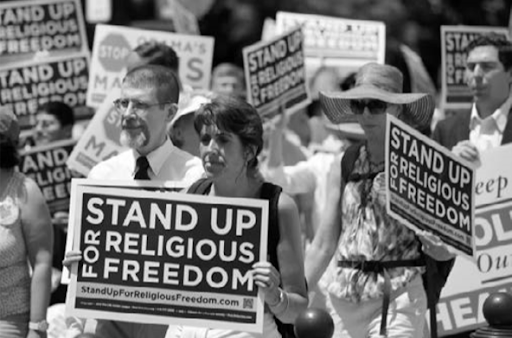I am rather fond of most of our freedoms. But one I’d like to get rid of is the freedom of religion. At best, that principle is completely superfluous, but in most cases it’s also discriminatory, arbitrary, and absurd.
The principle of “freedom of religion” is enshrined in the European Convention of Human Rights and the First Amendment of the U.S. Constitution. The constitution of my own country, Belgium, has a special article devoted to it (we call it “freedom of worship”), as do the constitutions of many other countries. Nonetheless, I think this principle should be abolished.
Why? All freedoms to which religious believers are entitled are already secured in the Universal Declaration of Human Rights, especially the freedom of thought and conscience and the freedom of assembly. Why must our secular constitutions include a special principle called “freedom of religion,” with some (as in Belgium) mentioning other beliefs and convictions almost as an afterthought? All opinions should be free, whether they’re called “religious” or not.
The special treatment of religion, to be sure, has historical roots. Our liberal principles originated in an era in which people were persecuted for their religious beliefs, by—it should be noted—people with a different set of religious beliefs. In a more mature liberalism, however, as developed by thinkers such as Spinoza and John Stuart Mill, religious liberty falls within the broader concept of freedom of expression. “Freedom of religion” is a relic from an era of religious intolerance, in which the most common reason why people smashed each other’s heads was that they worshipped the wrong god. Nonreligious differences of opinion simply didn’t provoke such hatred and wholesale slaughter.

But is there any harm in the redundant, separate mention of a freedom of religion in our constitutions and human rights declarations? Let’s compare it with the freedom of gastronomical beliefs or the freedom of opinions expressed on Thursdays. It is obviously superfluous but still harmless, right?
Unfortunately, it’s not that simple. According to a common misconception—that everyone is free to express, of course—religion deserves special privileges. All opinions are free, so goes the argument, but religious ones are freer than others. You always need to “respect” faith. After all, isn’t there such a thing as freedom of religion?
Rather than just being redundant, this interpretation of the freedom of religion is blatantly discriminatory. Take the Belgian Council of State’s recent recommendation that a general ban onthe unstunned slaughter of animals infringes on the religious liberty of Muslims and Jews, who are compelled by their faith to practice ritual slaughter without stunning. In this case, religion is given a free pass. The very same act is deemed illegal when committed by one group (atheists) but permitted for a different group (Muslims and Jews). As Brian Leiter argued in his book Why Tolerate Religion?, there is no convincing reason why religious beliefs and practices should be entitled to special privileges and exemptions from generally applicable laws. If you follow that line of reasoning, then a special principle called “freedom of religion” is inherently unfair and discriminating.
Moreover, what exactly is “religion,” anyway? By enshrining the illconceived notion of freedom of religion in our constitution, our poor state obliges itself to practice cultural anthropology and even theology. Does every authentic religion have a creation story or a belief in a kind of afterlife? Is a supreme being or religious service required? Is a holy book an essential ingredient? None of these characteristics is culturally universal. By the way, how many people do you need to form a religion? Is a single prophet’s voice in the wilderness sufficient?
Take our Eurocentric fixation on sacred books. The Qur’an contains vague stipulations about covering one’s body. Muslims frequently invoke those verses to demand the right to wear a headscarf anywhere. Ironically, many of those who favor a ban on the headscarf in European countries get bogged down in exegesis as well. Does the text really say one should cover one’s head or is the chest area enough? Does the ban violate religious freedom or not?
But that discussion is absurd. Believers enjoy the right to adopt an original or even ridiculous interpretation of any text. Consider this: Why would an ancient book qualify as a criterion in the first place? Suppose a Muslim woman claims that it’s her innermost conviction that Allah desires her to wear that headscarf, regardless of what the Qur’an or imam says. Perhaps an archangel personally whispered it into her ear. Whoever doesn’t recognize that as “religion” bows to the might of the majority and discriminates against religious innovators and minorities.
And think of it the other way around: suppose the Qur’an stipulates, literally and unambiguously, that women should walk around in burqas everywhere, with just a tiny slit for one single eye, as a Saudi cleric recently suggested. Would that force the state to admit: “The book says so, therefore we have to allow it?”

Is astrology a religion? Naturism? Rastafarianism? Everyone who fancies doing so can appropriate the label religion and all its attendant privileges, because there is no reputable anthropological definition of religionanyway. This is exactly what Scientology godfather L. Ron Hubbard did. After he had been sued for illicit practice of medicine, he rebrandedhis whole doctrinal shebang as a “religion,” as a result of which Scientology (previously Dianetics) nowadays still enjoys taxexempt status in the United States—because it’s a “religion,” you see.
If that’s how it works, this atheist cannot lag behind. The Almighty has just informed me, through my sensus divinitatis, that this article contains the infallible and final revelation concerning all religious issues: All of thee shall respect my religion! The very paper on which this revelation is printed is holy. Whoever throws away this magazine in the trash can, or runs it through the paper shredder, commits blasphemy.
Lord, deliver us from the freedom of religion!
Piece in Free Inquiry (january 2017). This article is adapted from an opinion piece published in the Belgian newspaper De Tijd, as translated by Leon Korteweg.